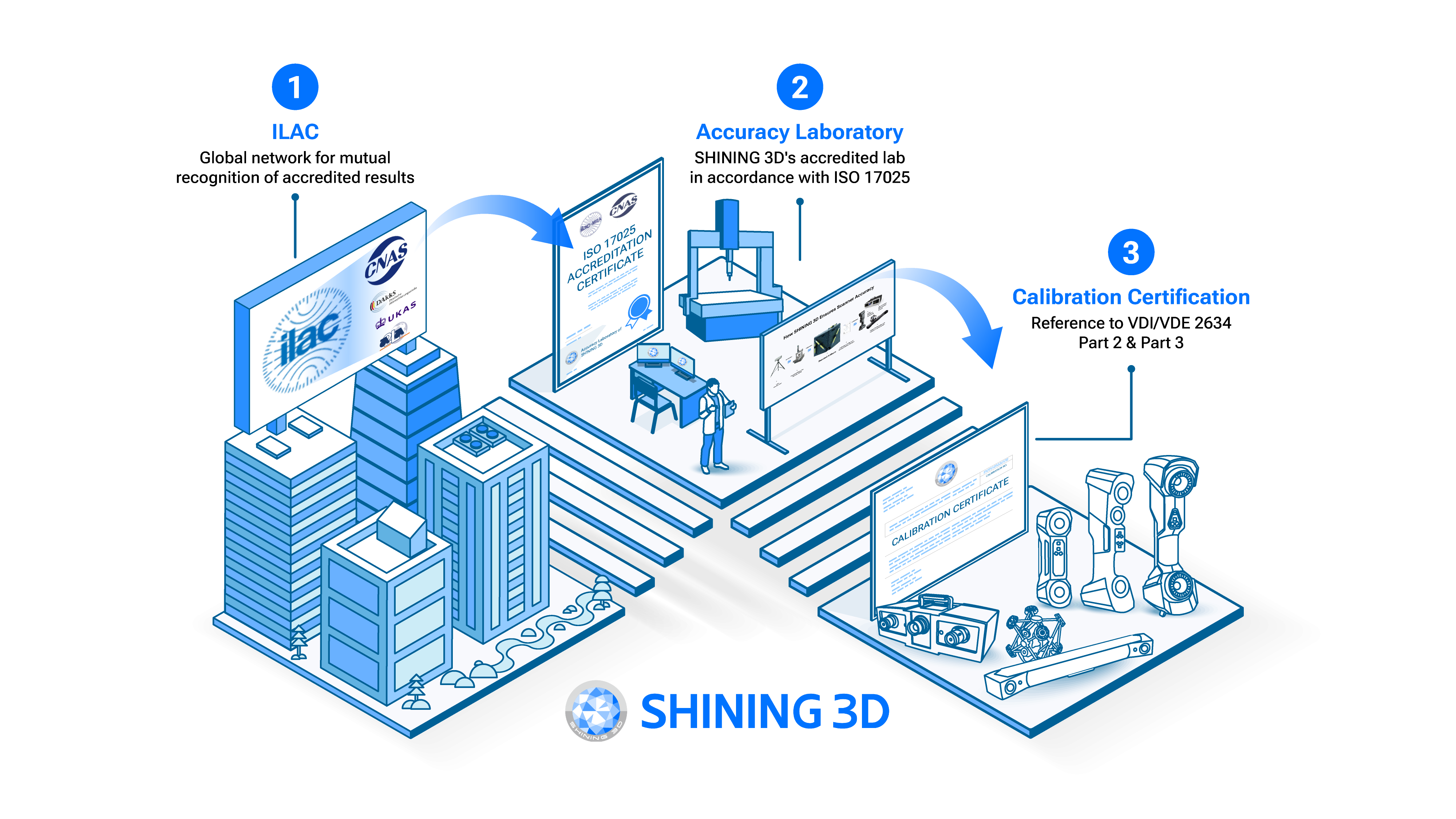
PR/News
Published on Jul. 15th 2024
Accuracy Certification Pathway: From CNAS Accreditation to VDI/VDE 2634 Calibration Certificate
Since 2004, SHINING 3D has focused on 3D measurement accuracy, with a full-cycle assurance system and an accredited lab. The lab was ISO 17025 accredited and received a CNAS certificate, enabling it to issue VDI/VDE 2634 calibration certificates for 3D scanners.

Accuracy Certification Pathway
In this blog, we will discuss:
- What is CNAS?
- What is ISO 17025 and how did the Accuracy Laboratory get accredited?
- What is VDI/VDE 2634 and whydo you need it?
What Is CNAS?
CNAS and International Recognition
CNAS, short for China National Accreditation Service for Conformity Assessment, is a member of the International Laboratory Accreditation Cooperation (ILAC), a global network of accreditation bodies. ILAC comprises over 100 member organizations from around the world, such as DAkkS (Germany), A2LA (US), UKAS (UK), JAB (Japan), among others.

CNAS and ILAC
These organizations, along with CNAS, contribute to mutual recognition agreements (MRAs) that promote the global acceptance of conformity assessments through accreditation. This means, products and services certified by CNAS are recognized and accepted in other member organizations.
CNAS: Ensuring Quality and Compliance
CNAS plays a vital role in China’s quality assurance and conformity assessment framework. It is responsible for accrediting various conformity assessment bodies, including laboratories, inspection bodies, and certification bodies.
CNAS employs a rigorous evaluation system to ensure that these bodies meet specific quality and management standards. This process involves comprehensive assessments and audits to verify compliance with international norms. Only CNAS-accredited bodies are authorized to carry out critical assessments that impact public health and safety.
What Is ISO 17025? Why Does It Matter?
Introduction to ISO 17025
ISO 17025 is an international standard specifically designed for testing and calibration laboratories. It sets the general requirements for the competence of these laboratories, ensuring that they operate consistently and generate reliable results.
As a member of ILAC, CNAS adopts ISO 17025 as a benchmark to assess and accredit testing and calibration laboratories. Obtaining CNAS accreditation signifies that a laboratory complies with ISO 17025 standards and can perform reliable testing and calibration. This accreditation allows CNAS-accredited laboratories to participate in internationally recognized MRAs, ensuring that their test and calibration results are accepted globally.
SHINING 3D Accuracy Laboratory Gets Accredited in Accordance with ISO 17025
In the Accuracy Laboratory, the calibration procedures strictly follow the VDI/VDE 2634 guidelines, including calibration conditions, calibration items/methods, and the handling of calibration results. 
How SHINING 3D ensures scanner accuracy
By doing so, SHINING 3D Accuracy Laboratory has obtained ISO 17025 accreditation certificate issued by CNAS. This means the laboratory possesses:
- Technical Capability: Ability to conduct testing and calibration services in accordance with relevant international accreditation criteria, ensuring accuracy and reliability in the testing process.
- Recognized Expertise: Acknowledgment of the laboratory’s technical competence, laying the foundation for providing high-quality testing and calibration services.
- Quality Management Systems: Implementation of quality and standardized management practices in line with ISO 17025 standards, ensuring reliable and accurate calibration results while enhancing work efficiency and operations.

CNAS Laboratory Certificate
Most importantly, as CNAS has recognized the Accuracy Laboratory’s capability to calibrate optical 3D measurement systems based on structured-light scanning, the in-house lab is qualified to provide calibration certificates based on VDI/VDE 2634 Part 2 & Part 3 for SHINING 3D’s metrology 3D scanners, ensuring the international credibility of the calibration reports.
Importance of VDI/VDE 2634 Calibration Certificates
VDI/VDE 2634 is a set of international standards issued by the Association of German Engineers (VDI) and the Association for Electrical, Electronic & Information Technologies (VDE). These standards are specifically designed for the calibration of optical 3D measuring systems. VDI/VDE 2634 Part 2 covers single-view systems; while Part 3 addresses multi-view systems. The standards ensure the accuracy and reliability of 3D measurements, providing guidelines for calibration procedures and performance verification.

VDI/VDE 2634 Part 2 & Part 3
Certificates based on VDI/VDE standards are highly regarded in the field of engineering and technology, providing rigorous guidelines and precision for various technical aspects.
For buyers and owners of 3D scanners, the significance of calibration certificates based on VDI/VDE standards is substantial:
- Compliance Requirements: In certain industries, these certificates are essential for ensuring compliance with company regulations. This reduces risks and guarantees that procurement processes meet necessary standards.
- Enhanced Product Quality and Safety: Industries with high safety requirements benefit from improved product quality and production safety facilitated by VDI/VDE certification.
- Reduced Costs: By ensuring accurate and reliable measurements, products with VDI/VDE calibration certificates help improve operational efficiency and reduce material waste, leading to significant cost savings.
Conclusion
SHINING 3D Accuracy Laboratory’s accreditation by CNAS and its qualification to issue VDI/VDE calibration certificates signify its adherence to international standards. This endorsement ensures the reliability and global recognition of the laboratory's calibration services, meeting stringent industry requirements and enhancing trust among stakeholders in the precision engineering and technology sectors. SHINING 3D is committed to consistently delivering accurate and dependable digital 3D full-size measurement solutions, contributing to advancements in quality assurance and technological innovation worldwide.
About SHINING 3D
Research & innovation in high-precision 3D vision technology
Founded in 2004, SHINING 3D has dedicated over 20 years to the research, development, manufacturing, and application of high-precision 3D digital products. Our focus on research and innovation in 3D vision technology allows us to offer accessible, efficient, and high-tech solutions. Committed to advancing the 3D digital technology field globally, SHINING 3D aims to drive the popularization and application of 3D digital technology.
Headquartered in Hangzhou, China, SHINING 3D operates subsidiaries in Stuttgart, Germany; San Leandro and Tampa, United States; as well as Chengdu, Tianjin, and Hong Kong, China.
